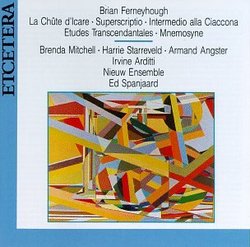Great showcase of complexity and ferocious virtuosity
John Wearden | 04/10/1999
(5 out of 5 stars)
"It's always heartening when a composer writes solo unaccompanied works. In a way it is a patrilinear legacy to foster succeeding generation of interpreters. Ferneyhough's music is an elitist affair, for musicians you need to devote a substantial part of your performing life to it. For us listeners there is no compromise here, why should there be? Ferneyhough's creativity has developed slowly over his career always searching for the next link in his vast labyrinth of musical procedures and processes.It has yielded a vigorous body of work with a devoted following. The "Superscriptio" is a piccolo solo, long a neglected instrument inhabiting the tippy-top of the sonoric field. Ferneyhough brings a fine sense of the natural purity of its sound traversing all its strident registers in a hightened display of rhythmic complexity. When we come violinist Irving Arditti we have a premiere interpreter of Ferneyhough and here the "Intermedio. . . " reveals an ugly virtuosity in all registers with fast clipped double stops, an anguished-like gestures. Arditti however has developed a distanced objectivity in anything he plays, as if his playing is a mere passive conduit for these coldly abstract musical structures . And finally the "Etudes Transcentales" we have full forces of the remarkable Nieuw Ensemble. Ferneyhough's innovations to my mind remain purely technical for he feels he needs to shape and share a dialogue with the past to find a frame for his work and expressive content His structural-global resolutions, the way a piece unfolds in time, are indeed commonplace. Frequently we find Ferneyhough resorting to traditional handling of his materials, simple contrasts,simple traversing of registers,relying on textural change to refocus. And the listening experience is all too often opaque and disorienting,like our emotive sensibilities must somehow cope with blizzards of ill-define materials. Here in the "Etudes Transcendantales"" we have an obvious reference to Listz,who was also a technical innovator who also resorted to a programmatic frame to contain his pianistic innovations. The texts here in the "Etudes" Songs 1,2, and 6 by Ernst Meister and others by Alrun Moll are all beside the point for it hardly matters if the text is heard. Couched in complex linear textures with continous linear movement in microtones, you become swept into the sheer complex power of this linear motion.The synergism which occurs in the marvelous counterpoint does not help to focus your hearing but disperses it. No image really emerges and Ferneyhough's linear technique is so refined so multi-directional that a programmatic element, as these texts, remains at a distance. The vocal atonal linear leapings doesn't help matters. This type of vocal writing (an historical affinity dating to Boulez's "Le Marteau. . . ") leaves the text by itself,words are not conveyed nor their images ,the voice is simply another instrument, not a conveyor but an accomplice in pitch linear purity.Ultimately this language of musical complexity is a relative one and within the force fields of postmodernity it is certainly a legitimate agenda for a creator to foster a musical language that will remain an exclusive creative enclave for some. The fact that this complexity will always appeal to a select few is commonplace and a sign that the ears as a perceptive organ haven't developed in its history. That is an historical perspective,not one which is created."


 Track Listings (13) - Disc #1
Track Listings (13) - Disc #1